 We caught up with our amazing volunteer judges to hear their thoughts on judging the many 2020 Monarch and Caterpillar Awards’ gardens. Erin Mallon, Landowner Outreach Technician with Conservation Halton. Erin is involved with the Cootes to Escarpment project and does invasive species management. She is working on the management action plan with the City of Hamilton, integrative management, chemical controls. She’s excited about the idea of using goats, like they do in Europe, to curtail invasive species. Why the interest in judging? I was interested in being a judge for the initiative for both personal and professional reasons. Professionally, I try to educate people on the importance of urban stormwater management, as well as native species landscaping. Personally, I think the Monarch Awards is a great initiative to raise awareness and give some recognition to those gardeners who do so to benefit nature. Using neighbours to spread the word is so much more meaningful, it’s a more lateral approach, than top-down. In my own garden, I’ve got all kinds of native plants, but I’m not quite there yet [for an Award], so this is a good opportunity to see what is working for others, learning first hand through these great gardens, how plants get along. I’m building a network and learning so much from this initiative, while at the same time, sharing my knowledge. Notable observations? The number one thing to mention is the absolute enthusiasm from the gardeners--they are excited, are good at troubleshooting and networking, they are a wealth of knowledge, and they are proud of their gardens. As well, there is a diversity of people--not your typical gardener--and a lot of ingenuity in some of the ways they use space, source plants, interact with the neighbours; there’s a lot going on. Favourite thing about your experience judging? I enjoyed the gardens--they are all dynamic and unique. One Ancaster resident has a really neat property, the front yard is so beautiful. 98% of the plants are native. She had silk moths. I saw caterpillars and eggs on this urban property. She had a permeable driveway, lots on the neat pathways, a tulip tree, paw-paw trees, a Monarch Waystation, big pond-- all inspiring. I was blown away! Challenges to judging/least favourite part? No challenges, but you know, some of the gardens don’t quite meet all the criteria, so it can be disappointing for some applicants, but I say, try again next year. 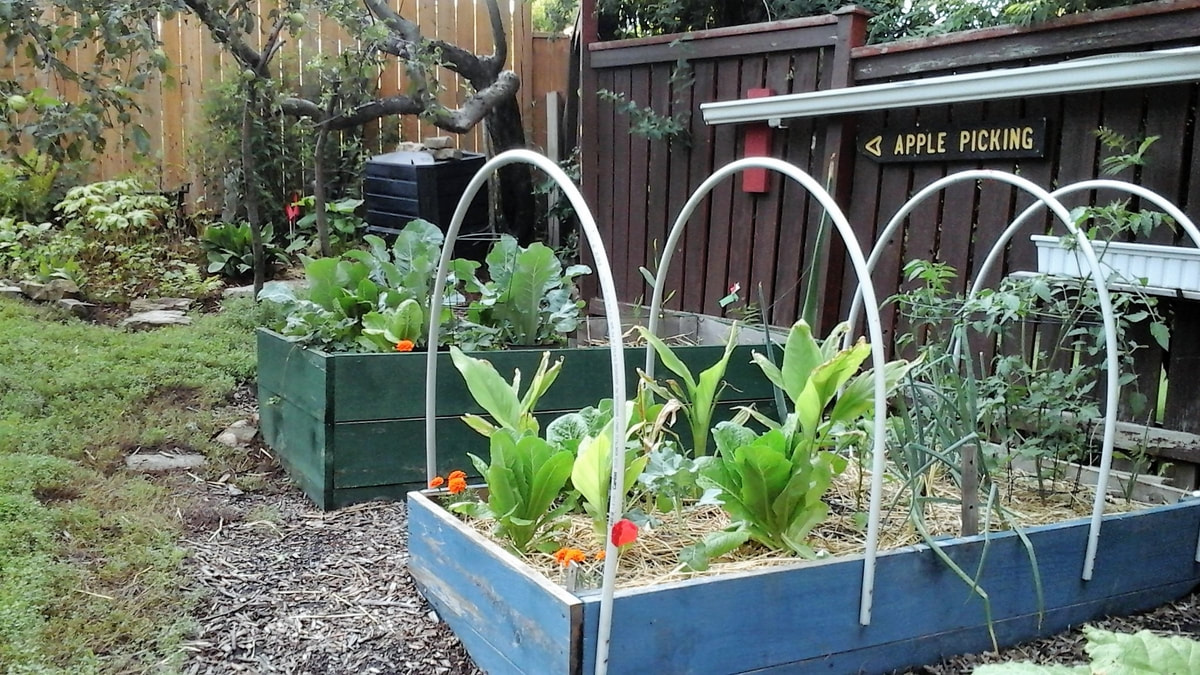 Vegetables and wildflowers, growing together in a Hamilton garden. Vegetables and wildflowers, growing together in a Hamilton garden. Michael Albanese President, Avesi Stormwater and Landscape Solutions Why the interest in judging? I was asked! I’ve been involved in the initiative, I was an award winner last year. I saw it as an opportunity to give back to the network. Notable observations? I saw people who were willing to put themselves out there, and go against the modern standards of ‘neat and tidy.’ Some gardens integrated food gardening into plant gardens--they had food providing habitat for pollinators. Plants have the ability to heal people, as well as keep land and community stronger. What we are trying to promote is fringe, but in the future, this is going to be the norm, and these people are pioneers. I really appreciated a garden in a downtown condo building in Dundas (see below for photos). It was a roof type garden, equal to a standard residential lot. Like every property I saw, the owners had a unique garden, they chose to emphasize that. As cities intensify, rooftop gardening is only getting popular, so much space up there that goes unused. I saw this property as a waystation for flying creatures-- a haven to hang out; they want to be up in the sky because it’s safer. There was lots of biodiversity, but it still needs more native species. Favourite thing about your experience judging? Getting to know the homeowners; it was obvious to me that they are invested, and that they understand that it is not just something to look at--so a provider mindset. Monarch Award types are givers/providers. Challenges to judging/least favourite part? The judging experience is similar to what I do, in my career. When we judge the landscapes, it's s more like we are looking at the mentality of the person: are they the domineering, almighty hand of the landscape, or the caregiver? You have to let nature talk back to you. If the plant doesn’t survive, it’s not a bad thing; this plant is saying maybe there is a more hospitable habitat, that maybe that a 50/50 split with the other plant doesn’t work for neither of them, that they work differently together, so we need to stop over-intervening. I saw a Trillium Award winning garden, I was torn, it’s neat, but there is no life here. It’s not nature, even though it’s a garden, there’s no ecosystem. But, something like the Monarch Awards and the Caterpillar Award celebrates all stages of people; you’d be amazed how much progress you can make in 1-2 years. 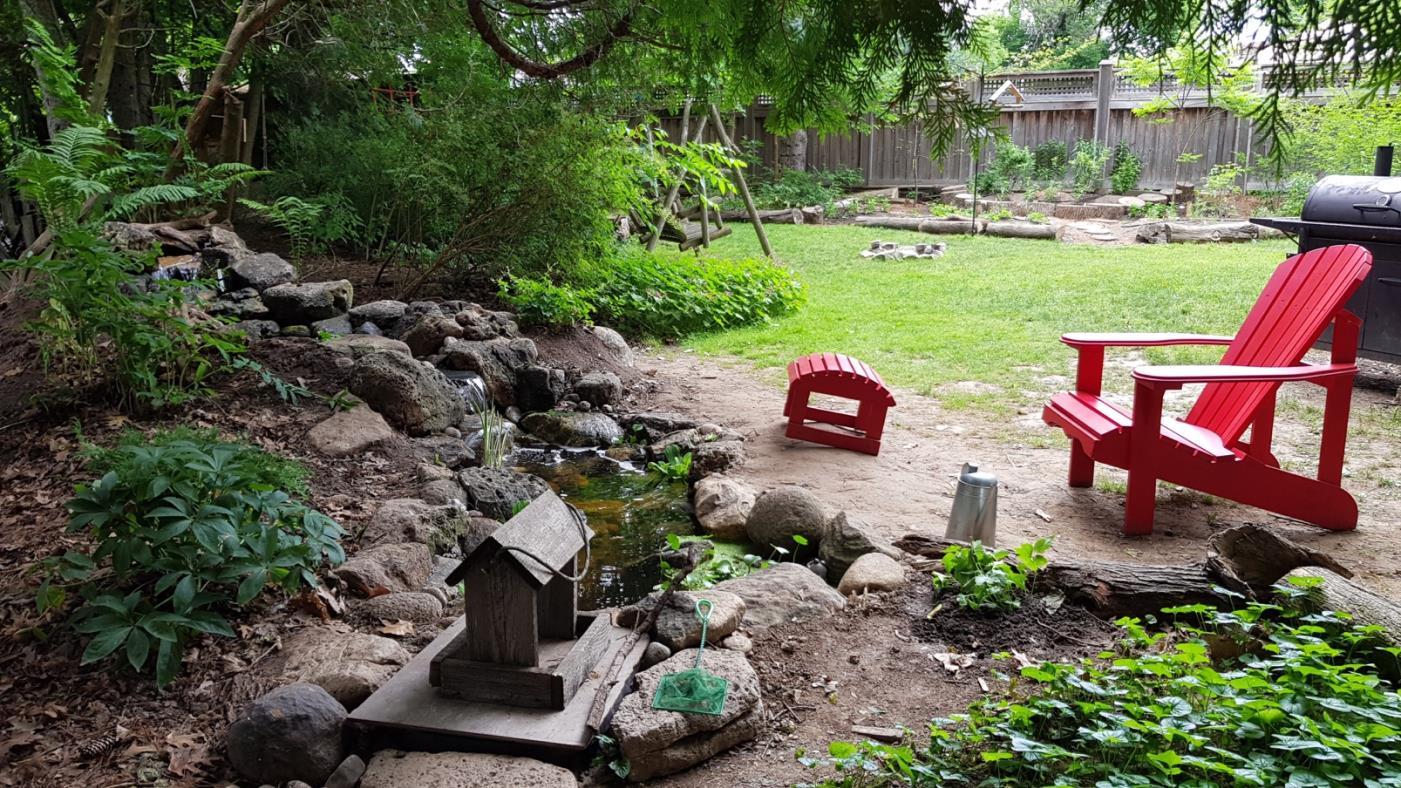 Water stewardship in a Hamilton garden, Westdale. Water stewardship in a Hamilton garden, Westdale. Sean James, Master Gardener, Chair of Landscape Ontario’s Environmental Stewardship Committee. Second-time judge. Why the interest in judging? People crave good news, and the Monarch Awards is a good news story. When I give talks to the industry, it’s like speaking to the choir. The Monarch Awards is an extraordinarily valuable initiative--it gets outside the choir, people show interest beyond the eco-world synergy. Not to say that landscapers are not doing it, Landscape Ontario is doing a lot to support eco-landscaping, but there is still a long way to go. Notable observations? It was amazing--from the most impressive to even the least, it was fantastic. Erin and I visited one lady; she was so over the top enthusiastic. She was showing us the caterpillars, this lady had all kinds of caterpillars, promethium moths, given by the poop, she was showing us the plants that were doing well--seeing all that life, that biodiversity, it was mind-numbing! Others were stewarding plants, harvesting water, sequestering carbon. One lady had her driveway paved but she is in the country, but the bads weren’t that bad, and the goods were good. And the stories that came with it! One lady told us about how she wanted to have an oak removed from her property. The company came; they said ‘no’ and they explained to her their reason. She learned a lot, and the oak stayed, so the customer is not always right (chuckles). Favourite thing about your experience judging? Seeing the difference people have made, seeing how people are buying into it. It’s a hopeful action; it’s not just that they can do it, it’s that they want to do it. If anybody can fix the world, it’s a gardener--we get better faster when we have food security, practice carbon-sequestering. We are not alone; a lot of people are doing the same steps--so it’s good to know that you are not alone. Plus, there’s real money making to be had. I drive a small Mercedes, so they see me being successful. Challenges to judging/least favourite part? I’m a pretty positive guy, but it’s hard not to be beaten down--our society likes to catch people doing wrong (our society is punishment), so when someone has done something right, and we can acknowledge them, and mean it, and recognize it publicly--that’s extremely important because then they want to do more right. It’s happening, we are making a difference. 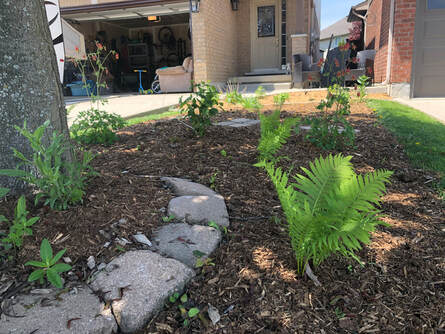 Good soil, Hamilton garden Good soil, Hamilton garden Charlie Briggs, Arborist and gardener at RBG. Third-time judge. Why the interest in judging? As I got into using plant material myself, I saw the benefits for the community to use my knowledge. It’s nice to make this commitment a long time thing. Notable observations? I think over the three years I’ve started to see a lot more people with typical gardens making that change, so we are successful in reaching out to the more standardized population. I saw people excited to show me their native plant materials, rainwater gardens, the numbers have gone up in the application. The whole Monarch Awards campaign makes a difference, and is starting to add up over the years. What stood out for me especially, was seeing a younger audience getting into it. Usually, at our workshops, most of the people I recognize, so it’s nice to see new faces, we’re not just preaching to the choir, and I would love to see this type of gardening continue in the future. Favourite part of judging? The biggest part for me is the one-on-one with people; it’s a massive benefit to share information and to see how some gardens reach a tipping point--like, ‘now I know how easy it is.’ Challenges to judging/least favourite part? I don’t want to be the face of disappointment , when people have these expectations, As far as the actual Monarch Awards go, I’m excited for next year! I want to encourage people, please apply. Even if you don’t receive an award, it’s so valuable to get feedback and a visit from a judge. Keep an eye out for workshops. RBG is going to be hosting planting of trees and the urban forest. Now is a great time to plant natives. Note** We received 44 applications. Of these 6 will be receiving a Monarch Award and 10 will receive Caterpillar Awards. Congratulations to all who applied. Remember to apply again next year!
2 Comments
Susan & Leslie MacMillan
7/4/2021 10:27:36 am
I was so honoured to receive the Monarch award. Thankyou to all volunteer judges. Charlie has a kind personality and had some great feedback about our Eupatorium perfoliatum/Boneset and other plants. Our Silphium perfoliatum/cup plants were mere babies and now they are 7ft tall. His visit was just before our Intermediate Bulk container (IBC) arrived to augment our 4 rain barrels. The IBC has helped tremendously during drought periods. Thanks to the diversity of insects, we have two nesting boxes of wrens and two with sparrows. Little by little, we can educate neighbours and passersby on the importance of environmental stewardship.
Reply
2/20/2023 06:42:05 am
Despite the fact that it could seem that the first step is the simplest, it's actually the most challenging
Reply
Leave a Reply. |
Archives
December 2023
Categories |
|
|
Butterflyway Hamilton: www.facebook.com/butterflywayhamilton/
Environment Hamilton: https://www.environmenthamilton.org/ Hamilton Naturalists' Club: https://hamiltonnature.org/ |


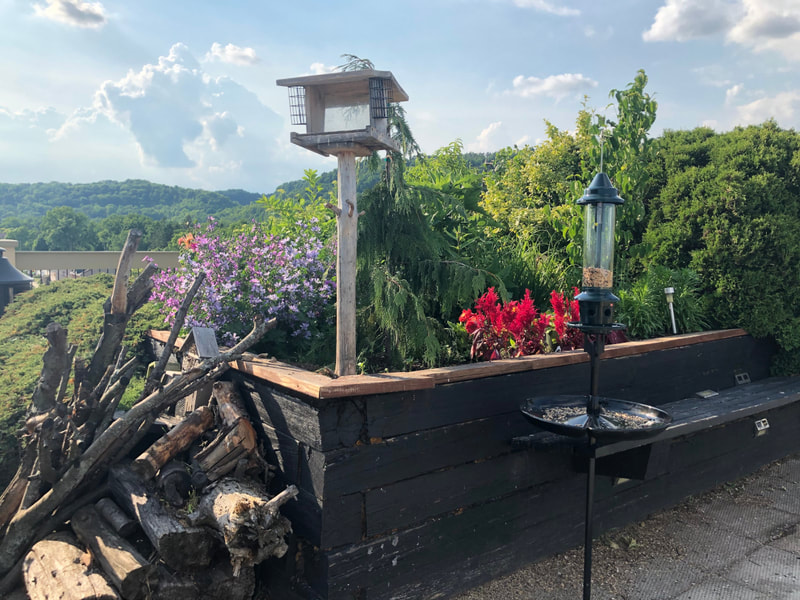
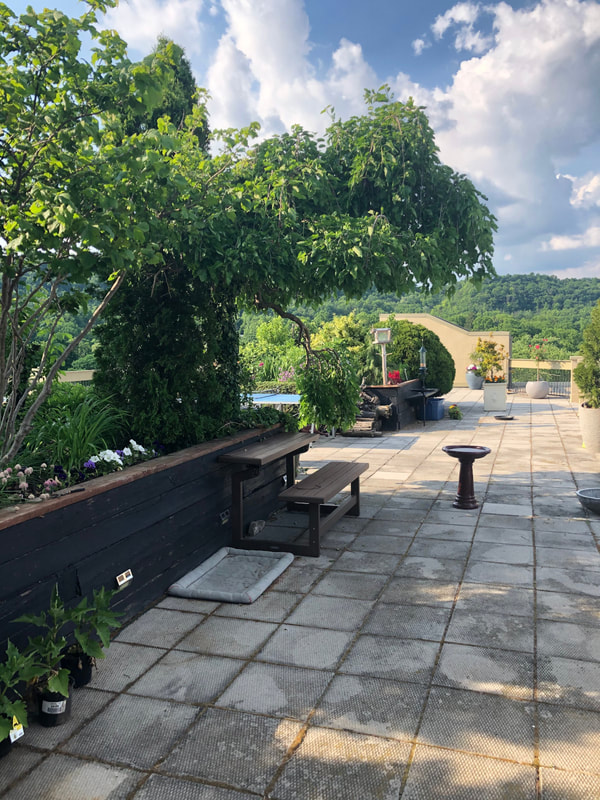
 RSS Feed
RSS Feed